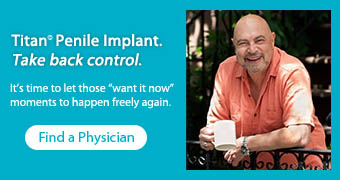Postby AussieRjay » Thu May 25, 2017 8:58 pm
You have to adopt the right mindset. You are not being "cured" in terms of a restoration of full natural function and health. That, of course, is the gold standard anyone would want. Reality intervenes however, inasmuch as it is simply not possible to effect a cure. This is true of many ailments, and wishing it were otherwise will not change things.
What you are (potentially) having done is the installation of a prosthesis. This word is bandied around, but I wonder sometimes if people really let this sink in. In almost all respects, it is analogous to the installation of a hip or knee prosthesis. You are replacing a natural body part / function that has broken down to the point where it is no longer functional.
How do knee implants compare to natural knees? They are painful and complicated to install. They carry substantial surgical risks. They are prone to failure and to wear - they do not last forever, and are therefore quite rationally installed as a last resort. They don't behave exactly like a natural knee - in range of motion, and other respects - but they get very close.
Sound familiar?
Now take someone with a worn out or damaged knee. That person can hobble around on crutches, singing woe is me, and live that way. They can scan journals of regenerative medicine, keeping track of progress toward treatments that will grow them a new knee from stem cells or some other miracle cure. They can spend a decade doing that if they like, all the while their mobility growing poorer and poorer along with their quality of life, waiting for a cure that may not come within their lifetime, or one which comes so late that years or decades of quality of life effectively have been wasted for nothing. They might get their cure in 20 years, by which time their cardiovascular system is in a bad way and they still can't walk far or at all! What a pyrrhic victory that would be.
Alternately, that person can have the knee replaced, now, and be walking again in a few weeks or months. It will not be the same as their original knee, but functionally it is usually a brilliant move which rapidly and durably restores significant quality of life.
I'm 44. I just had an implant installed. I spent years (25 - read that again: TWENTY-FIVE YEARS) hoping that I could be cured, that some miracle treatment for venous leak would present itself. So far, there have been a lot of hopeful noises and little else. Lots of hopeful noises that turn into nothing, and lots of shysters preying on desperate men. Dangerous experimental surgeries leaving people sometimes worse off than before (witness poor gollam's struggle with that). Stem cell treatments being run out of poorly regulated clinics. The list goes on. Half-way treatments that occasionally make small improvements but ultimately do not cure the problem, and do nothing but keep men in a holding pattern of fear, anxiety and false hope. One thing after another, for many men, tried and failed, each of them eating up months or years of that man's limited time on this Earth.
My choices, as of the day before implant, were to try one of those poorly evidenced procedures, continue to wait for a miracle (having already waited two+ decades for one, losing most of my prime male years to anxiety, stress and celibacy) or get the implant, a mature, refined technology with four decades of experience, incremental improvement and success behind it. Then start enjoying my life again. Once you run an impartial ruler over your options, with the rose coloured glasses off and the fantasies stripped down to actualities, it didn't seem like much of a choice existed at all. Be potent with an implant, however imperfect they might be, or remain impotent indefinitely. Remain stressed. Remain celibate. Remain that way til I am in a box.
Medical science may well cure the problem at the organic level in another 20 years (I don't for one second believe it is significantly closer than that). That will be magnificent if (big IF)/when it occurs. By then I will be 64. Should I bank on that, give up what's left of my prime, and endure another 20 years of ED and celibacy so I can screw like a maniac only once I am in my 60s? Come on. Firstly, I could be hit by a bus next week, and secondly I don't have the wealth to ensure that in my mid 60's I will be making out with partners as compelling as those I could attract now. That may well sound shallow, and it is, but I missed out almost wholly on sex in my late 20s, my 30s and early 40s with partners of that same age. From most accounts, the best years of many people's sex lives. I am having those that remain, thanks, not waiting and waiting for something that may not come or come far too late. I am unmarried / single. Should that too be allowed to persist another 20 years? Should I be looking to spend up to 40 or more years with the love of my life, or only to spend 10-20 with whoever will have me during my golden years - all because I held out for "perfection"? That certainly doesn't sound like a "perfect" life outcome to me.
No, implants are not perfect. They can never be perfect, because they will never cure the problem that caused the dysfunction in the first place. They restore most of that functionality and, like any other prosthesis, there are massive benefits to be had from that. This is where your focus must be - reality. A desire for perfection in an implant is really just another way of expressing the desire for restoration of full natural functionality - the very same fantasy that has caused all the angst to date and which will continue to do so as long as you refuse to accept any lesser outcome (ironically tolerating instead a much lesser outcome, in the form of choosing to continue to suffer your current disability).
The implant is quite rightly the option of last resort, just as knee replacements are. However if you are at the point of having no other options then you can choose to continue to pine for what will likely never be (or come too late to do you personally any good) or you can accept the best functional outcome you can obtain.
What causes people the most grief is lack of perspective. It certainly was for me. This is true of many mental health issues, and deciding what to do about persistent and disabling ED rapidly does become a mental health issue. Once you are able to make yourself perform a rational, dispassionate assessment of the situation you are in, you will perhaps then have the necessary perspective to make the best decision. While ever your head is full of anxiety and self-pity (how do I get cured when there is no cure, life sucks, woe is me) and fantasy (something will come along soon and cure me, I just know it) you can't perform that dispassionate analysis of your situation and options and you can't get the necessary perspective to make the right decision for yourself. If you want to take anything from this post of mine, take this: don't allow 25 years to elapse before you get your head into the real world and make that dispassionate assessment.
You can't choose whether your natural function returns. You most certainly can choose your own headspace. If you are considering implantation, I exhort you to obtain counselling or any other support necessary to get your head to the place where you have the required perspective to make an informed decision about the risks and rewards. Anyone going into an implant surgery with their head still in the messed up place I describe above would, I think, be at much higher risk of an adverse outcome in terms of satisfaction with both the implant and with their life generally post-implant.
My implant has not been activated yet, but I certainly did all the mental hard yards before I wound up on the operating table. My attitude to life generally improved considerably within hours of the surgery. I had made the dispassionate assessment, and I had followed through. The difficult part was over. All that remains is to adhere diligently to rehab (same as with a knee replacement), assess the functional outcome and maximise the life satisfaction to be had from that degree of restoration of function. For me, if that means that I can go from depressed sexless "victim" who lives with a dog, to a man with a loving partner, an active sex life and my headspace freed for concerns other than the non-working state of my dick, that's as good a functional outcome as I could reasonably hope for. Will it self-erect on a sexy thought? No. That's reality. Will it erect on demand and eradicate performance anxiety? Yes. That's reality. Is that as good as it gets for me? Yes, that is the final reality. At my present age and with the present options, that is as good as it gets for me. Is that something to be sad about? That's down to your state of mind. You can continue post-implant to wallow in misery with a victim complex if you wish. It won't change anything and wholly defeats the purpose of going through the procedure. Or you can take the minor miracle you've been given and - like someone with a new knee - get out of the house and go walking once more. That is a choice entirely within your own control - you can choose to wallow in a victim mentality as long as you wish, and you can choose to cease doing so. Which of those is likely to lead to happiness, do you think?
If you are still researching and deliberating, make sure your decision making process is grounded in reality, not tossing around fantasy "options" which aren't actually open to you and may never be. What can I do about the problem in real concrete terms right now? Not pie in the sky stuff - reality. That would be pills, injections, VED or implant. Assume the first three have failed. What is likely to come along in the near (not distant) future that might present another option? Anything? No. Not really. Will an implant cure me of the original causation of the ED? No. Will it give me back a life and a level of functionality I can be happy with? That depends on the success of the surgery, your own attitude, and whether you have set your expectations in accordance with reality - or if you are still living in a world of fantasy cures. The reality is that an implant can provide something approaching full function, not unlike the replacement knee. You will be able to have sex, and you will be able to remove the debilitating anxiety and self loathing from your life. It is astonishing, really, that an option so successful is available at all. Men's health generally doesn't get a lot of attention and we are beyond fortunate that this option is open to us.
I choose to be optimistic about where my life will be in a few months. Like the man with the bung knee, I choose not to sit at home and moan that never again will my knee work like it used to. I choose to restore my ability to walk, and then go walking.
If they are growing new knees in 20 years, I will look then at whether there is anything in that for me. In the meantime I will have been out walking and living my life for the prior 20, not sat at home whining, embittered and atrophied.
44yo, venous leak since late teens. Destroyed 2 relationships and all self confidence. Implanted 9 May 2017 by Dr Chris Love, Melbourne Australia - Titan 23cm. Looking forward to a new life.






